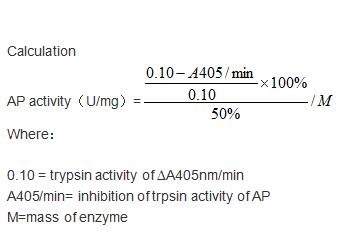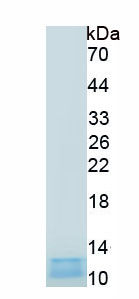Active Aprotinin (AP) 

BPTI; Trasylol; Pancreatic Trypsin Inhibitor; Basic protease inhibitor
- UOM
- FOB US$ 295.00 US$ 738.00 US$ 1,476.00 US$ 4,428.00 US$ 11,070.00
- Quantity
Overview
Properties
- Product No.APA968Po61
- Organism SpeciesSus scrofa; Porcine (Pig) Same name, Different species.
- ApplicationsCell culture; Activity Assays.
Research use only - DownloadInstruction Manual
- CategoryEnzyme & KinaseCardiovascular biologyHuman gene deletionHepatology
- Buffer FormulationPBS, pH7.4, containing 5% Trehalose.
- Traits Freeze-dried powder, Purity > 90%
- Isoelectric Point6.3
Sign into your account
Share a new citation as an author
Upload your experimental result
Review

Contact us
Please fill in the blank.
Activity test

Aprotinin (AP) is a competitive serine protease inhibitor. Reversibly binds to and blocks the enzymatic active site. Inhibits a range of serine proteases including trypsin, chymotrypsin, kallikrein and plasmin. Inhibits cytopathogenic effect of SARS-CoV-2 and double-stranded RNA formation in SARS-CoV-2-infected cells. The activity of recombinant pig AP was measured by its ability to inhibit trypsin cleavage of a peptide substrate BAPNA in the assay buffer 200 mM Triethanolamine hydrochloride, 20 mM CaCl2, pH 7.8. The reaction was performed in adding 20 μl 4 mg/mL trypsin diluted by 1mM HCl to 160 μl assay buffer and 20 ul 0.85% (w/v) NaCl and start the reaction by adding 100 µl of 1mg/ml BAPNA. Include a substrate blank containing 160 μl assay buffer, 20 μl 1mM HCl, 20 ul 0.85% (w/v) NaCl and 100 µL of 1mg/ml substrate. Rapidly mixing at 25 ℃, then read at 405 nm in kinetic mode for 5 minutes using a microplate reader controlling the ∆A405nm/min=0.08-0.12. The 20 ul different concentrations of recombinant pig AP was incubated with 20 ul 4 mg/mL trypsin in 160 ul assay buffer at 25℃ for 10 minutes followed by adding 100 ul substrate, then read at 405 nm in kinetic mode for 5 minutes using a microplate reader. Under these conditions, the enzyme amount of 50% inhibition of trypsin activity per minute is defined as a unit. The specific activity of recombinant pig AP is >9000 U/mg.
Usage
Reconstitute in 10mM PBS (pH7.4) to a concentration of 0.1-1.0 mg/mL. Do not vortex.
Storage
Avoid repeated freeze/thaw cycles. Store at 2-8°C for one month. Aliquot and store at -80°C for 12 months.
Stability
The thermal stability is described by the loss rate. The loss rate was determined by accelerated thermal degradation test, that is, incubate the protein at 37°C for 48h, and no obvious degradation and precipitation were observed. The loss rate is less than 5% within the expiration date under appropriate storage condition.
Increment services
-
 BCA Protein Quantification Kit
BCA Protein Quantification Kit
-
 Molecular Mass Marker for Protein
Molecular Mass Marker for Protein
-
 Monoclonal Antibody Customized Service
Monoclonal Antibody Customized Service
-
 Polyclonal Antibody Customized Service
Polyclonal Antibody Customized Service
-
 Protein Activity Test Experiment Service
Protein Activity Test Experiment Service
-
 Electrophoretic Mobility Shift Assay (EMSA) Experiment Service
Electrophoretic Mobility Shift Assay (EMSA) Experiment Service
-
 Buffer
Buffer
-
 Lentivirus Packaging Experiment Service
Lentivirus Packaging Experiment Service
-
 Adenovirus Packaging Experiment Service
Adenovirus Packaging Experiment Service
-
 Real Time PCR Experimental Service
Real Time PCR Experimental Service
-
 Spike RBD Protein (S-RBD)
Spike RBD Protein (S-RBD)
-
 Protein G
Protein G
-
 Protein A
Protein A
Citations
- Aprotinin prevents proteolytic epithelial sodium channel (ENaC) activation and volume retention in nephrotic syndrome.pubmed:29042083
- diss_Menacher word
- Plasminogen deficiency does not prevent sodium retention in a genetic mouse model of experimental nephrotic syndromePubmed: 32455507
- Evaluation of The Relationship Between Apelin 36 and Oxidative Stress In Patients With General Anxiety Disorder







